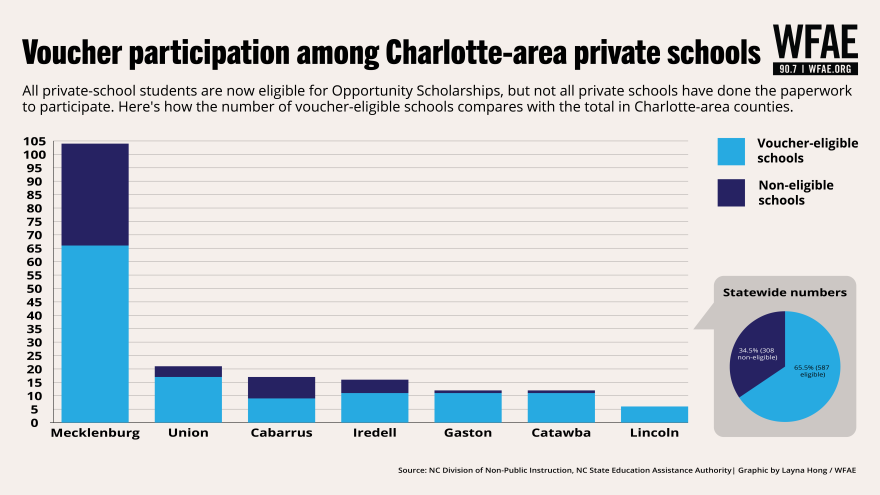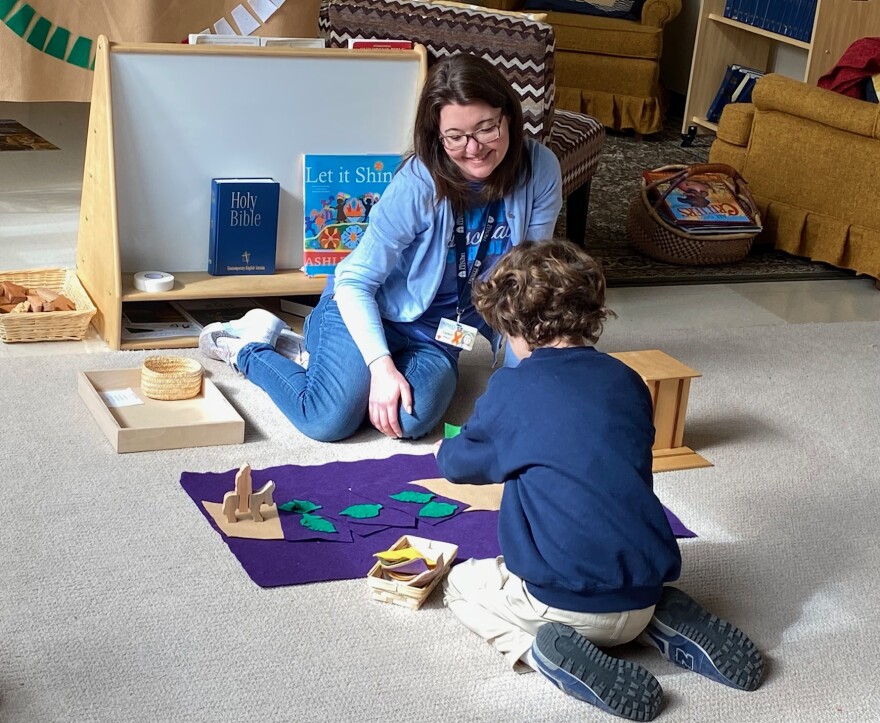The expansion of North Carolina’s Opportunity Scholarship program is shaking up the 2024 private-school application season — but how it’s playing out varies by school.
Greg Monroe, superintendent of Catholic schools for the Diocese of Charlotte, says he’s seeing three or four times the normal level of applications, something he attributes to more families being eligible for larger scholarships.
“As we expand the Opportunity Scholarships, it allows us to reach more diverse neighborhoods and communities that didn’t think they could ever attend a Catholic school,” Monroe said. “It goes right to the heart of our mission of serving all of God’s children.”
North Carolina currently has at least 127,000 students enrolled in private schools — the last count was taken in 2022-23 — and about 32,500 of them are getting state-funded scholarships to help pay tuition. Effective in August, the General Assembly has removed income caps and opened the scholarships to students who are already attending private schools without the aid. That means all students could be eligible for public money in the coming year.
But not all private schools are taking part. North Carolina has almost 900 private schools, and fewer than 600 accept Opportunity Scholarships. Mecklenburg County has just over 100 private schools, and almost 40 of them don’t take vouchers. That includes some of the most expensive and prestigious schools in Charlotte and other cities.

“The big schools — the Country Days, the Latins, the Providence Days — have very robust financial assistance programs. And they are able to help families close those gaps if there are financial needs,” said Stephanie Keaney, executive director of the North Carolina Association of Independent Schools.
Shannon Drosky, communications director at Charlotte Country Day School, says that’s the case at her school.
“We’re not anti-Opportunity Scholarship,” Drosky said. “It just really doesn’t fit within our financial assistance model.”
Who gets what?
Opportunity Scholarship payments are based on family income. The maximum amount covered by state money next year is $7,468, for families eligible for federal lunch subsidies. That’s up to $57,720 for a family of four.
The current state budget makes all families eligible for at least $3,360 — if there’s enough money to go around. But with a record 72,000 applicants this year, state officials say this is likely to be the first year when there’s not enough. If that happens, current scholarship recipients and lower-income newcomers get top priority.

How far that money goes toward covering tuition depends on the school and grade level.
In Mecklenburg Area Catholic Schools, tuition for elementary school students from Catholic families is $8,571. That means a voucher would cover 87% of tuition. Older students and non-Catholic students pay more, up to $19,521 for a non-Catholic high school student.
Some private schools have tuition that tops out at more than $30,000 a year. A voucher wouldn’t come close to paying that bill. But with affluent families now eligible for state money, at least in theory, Keaney says schools that haven’t signed up for the voucher program are likely to get some pressure to join.
“I feel confident that everyone is answering questions from at least a handful of their parents,” she said.
More money, more accountability
The requirements for schools to receive Opportunity Scholarships are modest: Submit a tuition schedule and a criminal background check on the school’s top official, do an annual audit and give students a nationally standardized exam of the school’s choice. Test results and financial information are not disclosed to the public.
But the legislation that expanded the voucher program is changing the testing requirements for schools that take state money, a move designed to give state officials a point of comparison between state-subsidized private schools and public schools. The details are still being worked out.
The Association of Independent Schools is made up of about 90 nonprofit schools that are accredited — a step Keaney says the majority of North Carolina’s private schools don’t take. She says her members are aware that some schools aren’t meeting the same academic standards.
“The bar is not very high to become a school,” she said. In the state’s requirements, “very little is said about curriculum.”
And Keaney says more oversight makes sense.
“We are creeping toward half a billion dollars toward this program annually. And everyone deserves to know that that money is being spent well,” she said.
But Keaney says the uncertainty about testing, along with the possibility that new required tests won’t reflect the schools’ curriculum, are deterring some private schools from signing on.
A spokesperson for Charlotte’s Providence Day School cited “the unknown state requirements surrounding mandated testing as well as other state requirements that may be mandated in the future” as a reason that school isn’t ready to join the scholarship program.
Faith, academics and diversity
The majority of North Carolina’s private schools, and of those participating in the voucher program, are religious.

One of them is Trinity Episcopal, a K-8 school located at the eastern edge of uptown Charlotte. Its tuition is about $24,000 to $26,000 a year, and it provides its own financial aid to 28% of students. Head of School Imana Sherrill says the Opportunity Scholarship expansion helps promote diversity — “not just diversity of culture but also socioeconomic diversity.”
Only 12% of Trinity’s 437 students are Episcopalians, while 26% didn’t specify a faith in their application. The rest are a mix of other Christian denominations, Jews, Muslims and others, according to the school profile.

Students attend faith studies and chapel. They also take traditional academic subjects, and the school is accredited by the Southern Association of Independent Schools and the Southern Association of Colleges and Schools. Trinity prides itself on sending students on to success in high school and college.
“We’ve always said that we’re not trying to create little Episcopalians,” Sherrill said. “We want to nurture kids through their own spiritual journey.”
Sherrill is a West Charlotte High School graduate whose son attends a public high school. She says she’s sensitive to the concern that more money for vouchers could come at the expense of public school funding.
“There’s part of me that wants to make sure that public school students still get what they need,” she said, but she’s convinced that what some students need is best provided by schools like hers.
Recruiting in six languages
When Tyler Kulp, the principal at Our Lady of the Assumption Catholic School, prepared information about the expansion of Opportunity Scholarships this year, he had it translated into six languages: Spanish, French, Burmese, Arabic, Tigrinya and Vietnamese.

The K-8 school is located in east Charlotte, where all those languages are spoken. Kulp wanted current families and potential newcomers to know that starting in August, they’re eligible for state money that could put a big dent in their tuition bill.
Kulp says his school represents “a very robust, diverse community,” and he expects enrollment to grow from 185 this year to 230 next year because of the scholarship expansion.
Karen Posadas enrolled her daughter at Our Lady of the Assumption 13 years ago, when she started kindergarten. There were no Opportunity Scholarships then. Posadas says it was a financial strain, but she and her husband were drawn by the mix of religion and strong academics.
“We are from Guatemala and we grew up Catholic, so we wanted that same environment for our children,” she said.
Now Posadas has two children in Catholic schools, the oldest a high school senior. And she’s secretary at Our Lady of the Assumption, where she helps explain the scholarship program to other Spanish-speaking parents. She says it’s a joy seeing faces reflect “that little light of hope that they can probably do the process, apply, and hopefully not have much to pay at the end.”

Monroe, the diocese superintendent, says his schools offer licensed teachers, buses and support for students with disabilities, even though those things aren’t required for private schools.
“We have consistently showed on nationally standardized tests that our students do very, very well,” Monroe said.
Monroe says the increase in state support will provide financial relief for families, and may provide Catholic schools with additional revenue that can be used to support such things as expanded pre-kindergarten programs.
“We think it’s great that parents have an opportunity to take their hard-earned money and put it to where they believe their child will excel the most,” he said.
The landscape keeps shifting
School choice has already been transforming the educational landscape in North Carolina and the Charlotte region, with a growing share choosing alternatives to traditional public schools. The chief financial officer for the Department of Public Instruction says it’s become so hard to accurately forecast public school enrollment that the state needs a new way to allocate money based on student numbers.
The full impact of the Opportunity Scholarship expansion remains to be seen, as families lock in their choices for 2024-25. Meanwhile, the General Assembly is likely to face renewed discussion of funding for the program in this year’s short session, with some advocates calling for an even bigger increase while critics call for a moratorium.







